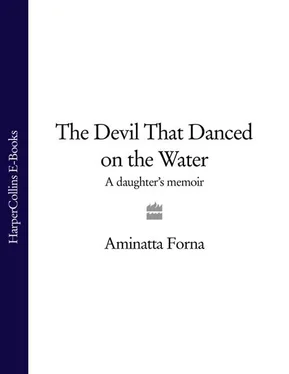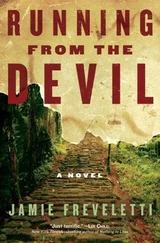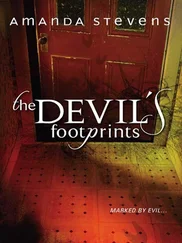1 ...8 9 10 12 13 14 ...27 In the afternoon my mother drove around town in her car asking people to pay their invoices for the clinic and sometimes I was allowed to accompany her. We drove from house to house, along the corrugated roads, rocking up and down on the car’s springy suspension.
In the 1920s Koidu was a rural village of no more than a hundred or so people, built around an intersection of roads heading east and south, in the cup between the Nimini and Gori hills. The people who lived there were mostly farmers, descendants of the same clan, who had lived identical lives for generations.
Almost overnight during the 1950s the population of the tiny hamlet flashed to twelve thousand as people converged from all over the country, drawn by a silent siren’s call. Government clerks left their desks in Freetown and took to the road; teachers walked out of the classrooms to dig in the mud of river beds; so many farmers abandoned the fields that the price of rice rocketed. Within months there were nationwide riots.
Diamonds. They washed up in the water of streams, hid in the soft silt beds, even glinted underfoot on the roads and pathways. It was said that in Koidu people didn’t look where they were going but walked everywhere with their heads bent down, gaze permanently trawling the ground for stones; people called it the ‘Koidu crouch’. Eventually, the government was forced to declare an emergency and even offer to raise salaries to woo their civil servants back.
In many ways Koidu was like a town in the old Wild West. The cinema even had a bullet hole in the middle of the screen where someone in the audience lost patience and shot the baddie. There was only one road that constituted the town; it had a single mosque; next door to this was the nightclub – really just a bar selling beer and spirits – and farther on a few Lebanese-owned shops.
The Lebanese merchants were very sociable and always gave a tiny cup of coffee with cardamom and a piece of baklava to my mother, and a Fanta to me, while they went over the doctor’s bill. When time came to pay, my mother told me, they always asked for ten per cent off, sometimes twenty. In the beginning she felt obliged to agree because they had been so hospitable, but after a short while she got into the practice of adding ten per cent before she presented the bill. The whole transaction was executed with displays of excellent humour, smiles, more sweet, black coffee and, for me, another fizzy drink.
My mother told me a story about her visits to our Lebanese clients. They always pressed her to accept a drink, but my mother rarely touched alcohol. One day she laughed and declared: ‘I only drink champagne.’ They took her at her word and the very next time she visited a bottle of champagne was brought from the fridge and opened. Of course, she had to accept. Gradually the word that the doctor’s wife only drank champagne spread and everyone began to keep some in the fridge just for her.
They liked to spoil her. When she shook hands to go the men would hold onto hers, patting it, and look directly into her face; they smiled, showing gold teeth. The women complimented her clothes. They treated her as though she were special, as though she were one of them.
The autumn after my parents were married in Scotland, my brother was born. My father delivered his first son himself. He graduated soon after and almost exactly a year later my sister came along. Then the family moved to Glasgow, where my father pursued an extra qualification in obstetrics.
All this time my mother had been turning slowly from white to black. At the university in Aberdeen the African students were considered exotic. People knew they had gilded careers waiting for them; they were the chosen ones – at least where they came from. Out in the city there were few enough blacks for them to be considered rare birds and accorded a measure of tolerance.
But with each child my mother found her skin darkened, almost as though it were a side effect of pregnancy. By the time we moved to Glasgow she was virtually transformed into a full-blooded Negress. People began to treat her the way they sometimes treated my father. They stared at her as she walked with me in the pram, my sister perched on the back and my brother following behind; and they cast remarks under their breath, barbed like a fisherman’s fly, deftly designed to land just within earshot.
When my father was with us men would yell, ‘Look at the darkie!’ and spit the word ‘whore’ with guttural emphasis. If we were alone then quite often old ladies would come up to say how cute we children looked, and stroke our heads.
Bellshill Maternity Hospital, where I was born, served the working-class outlying Lanarkshire suburbs. It was a massive concrete edifice, entirely surrounded by council houses, like a factory producing baby Glaswegians by the score. I went back only once in my life on my way through from Aberdeen to London, when I looped round the country via Glasgow to see my first home. As I walked into the maternity hospital I was forced to squeeze past a group of heavily pregnant women, dressed only in pastel dressing gowns and slippers to guard against the damp October air, chain-smoking outside the front entrance.
Outside our bungalow in Ardgay Street I sat in my car, waiting, trying to make up my mind whether or not to knock on the door and explain to the inhabitants that I had once lived in their house. My drive through the neighbourhood had told me it was poor, but beyond that I hadn’t much idea of what sort of people lived here. I had seen no black or brown faces, but then again there had been few people on the freezing streets. I dithered, folded and refolded my map. I reached for the door handle. At that instant the door of 19 Ardgay Street flew open: a man with a shaved head, holding a piece of wood, stood there and seemed to stare straight at me. A Rhodesian ridgeback bounded past him and up to the front gate. My nerve failed. I started the ignition and drove away.
Back then we were broke and we were black. We survived on my father’s grant, stretched to meet the demands of each new baby. It was tough to find anyone who wanted to rent us a place to live. Lots of the advertisements specified ‘no blacks’; sometimes it said ‘no foreigners’, which was another way of saying the same thing.
Searching for a house could be so difficult that one medical student put a large advertisement in the local newspaper in capitals: BLACK DOCTOR SEEKS ACCOMMODATION. He said it cut short the process of going to see apartments which were always gone the moment you showed your face. My father went to Bellshill Maternity Hospital, where he was taking up his internship, found another black doctor who was leaving to go home, and asked him if he could rent his apartment.
The five of us lived in two rooms in Ardgay Street. The Shettleston house was owned by a couple who ran a driving school and lived in the other wing. Above the door was an inscription to ‘Our Lady of Fatima’. There were times on a Saturday night when a brick would crash through the two windows facing the street; but my mother said it was because they were Protestants and thought we were Catholics, not because we were black.
The hospital where my father did his rounds and delivered babies was a different world; he was treated with great respect and his patients adored him. People talked about his wonderful ‘bedside manner’. It was years before I understood what they meant. I imagined my father sitting next to his patients, eating from a table elaborately laid with every kind of silverware, de-boning a sole or delicately peeling a peach with a knife.
When I was six months old a letter came from the family in Sierra Leone. It was from our father’s father. Ibrahim, one of my father’s elder brothers, had died; our grandfather begged Mohamed to come home at the earliest and help take care of the family.
Читать дальше












